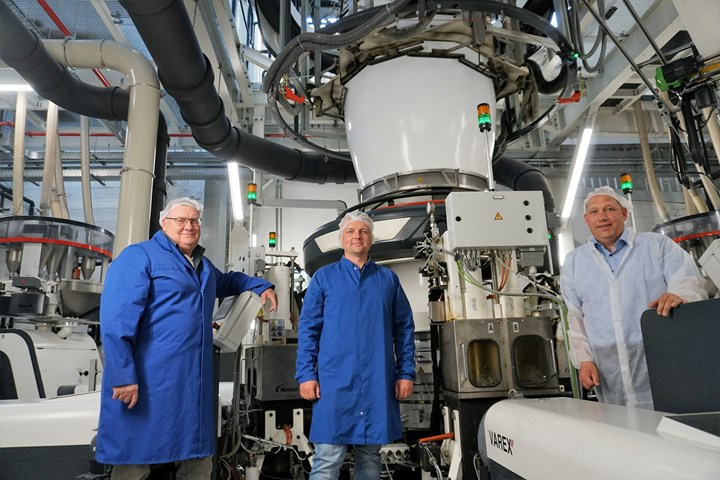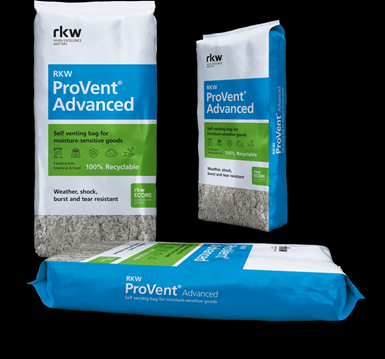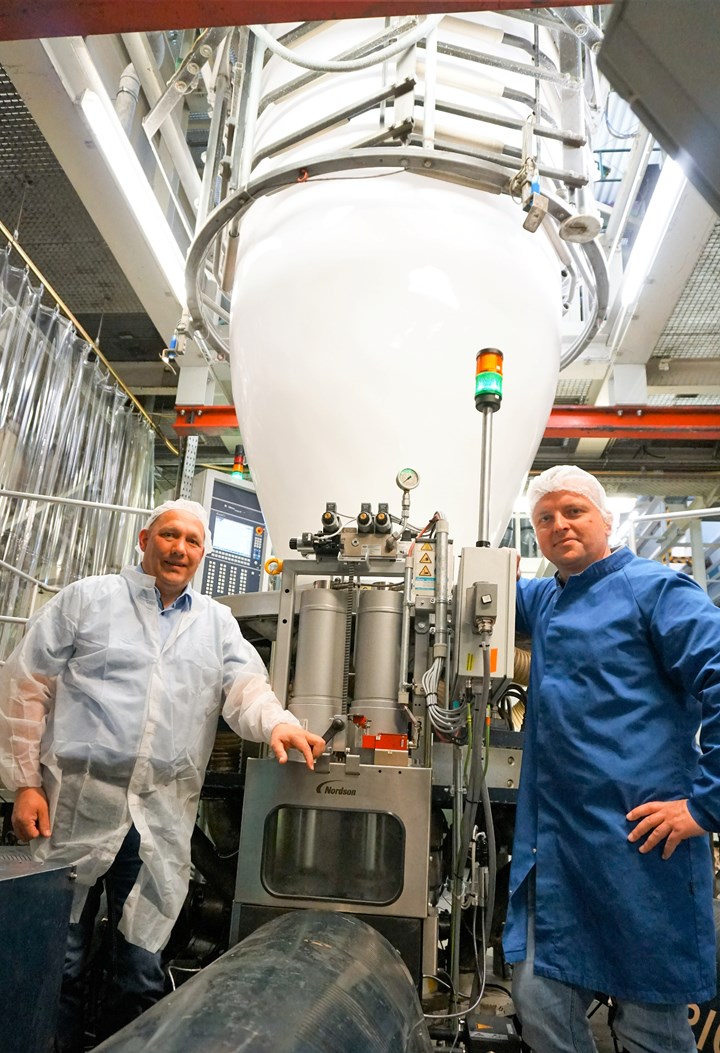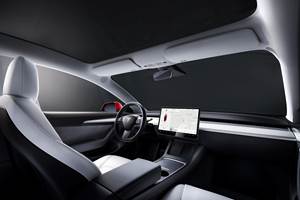Filtration System Helps Film Processor Manage Recycled Material Mandates
Global film processor RKW teams with Nordson to enable it to process blown film with high recycled content.
In Europe, film processors are beginning to change the way they make products. Taxes on the use of virgin materials in packaging, part of the European Green Deal, means processors must tweak their processes to accommodate a larger volume of recyclable materials unless they want to pay more by using all-virgin materials. In super-thin, high-speed blown film processing particularly, this has been known to create a wide range of technical challenges and processing headaches.
At what point do governments in the U.S. follow this model? None so far, but virgin-material levies are certainly being bandied about nationally and locally. The message? Best be prepared.
Film processor in Echte, Germany, was indeed prepared. In fact, “We have been using recyclables in our films for many years,” explains Thomas Steffen, an application engineer at the company. “These films are subsequently used in products where quality standards can be met through recycled material”
Efficient filtration is crucial when using recyclates to maintain the quality of the end product. Melt filters have been utilized in blown film lines for many years, but for the most part these filters were mostly discontinuous, meaning the line needed to be shut down for a screen change. “In processes with clean virgin material, this is not a problem,” says Stefan Wöstmann, process engineer at Nordson BKG. “The filters here take on a purely protective function and ensure that no loose screws from the material feed or other transport contaminants get into the process. But the degree of contamination is so low that screen changes are rarely necessary.”

RKW’s Thomas Steffen (left) and Sven Pastrik, with Nordson’s Stefan Wöstmann with a continuous BKG NorCon K-SWE. Photo Credits: Nordson
Adding more recycled material to the mix, however, means the process needs to accommodate an inconsistent material component that has more impact on the final product. “The quality of the recyclate containing dirt particles fluctuates significantly,” says Sven Pastrik, RKW’s manager of extrusion at RKW in Echte. “So we cannot guarantee that the quality of the final product is always the same. We needed to be flexible to accommodate varying levels of contamination,”
RKW’s first move was to install continuous-style screen changers. These filters enable operators to change screens without interrupting production, and to adjust screen fineness for different production batches based on quality requirements. “As a result, we have had significantly fewer machine downtimes, and the productivity of our lines has increased significantly," Pastrik reports. “We can compensate quality differences in the material very well and process high proportions of recyclate in, for example, in our form-film-seal (FFS) bag production.”
One such FFS bag is the RKW ProVent, commonly used in the construction and chemical industry for packaging powdery goods. For that application, the use of recycled material is becoming more prevalent and continues to increase. Explains Steffen, “Here, it is essential that the protective and barrier properties are guaranteed and that no dust, dirt or moisture can penetrate. We inspect our films with optical systems before further processing.”

RKW’s ProVent FFS bags are used in the construction and chemical industry for packaging powdered materials.
Steffen adds, “But for us, finding defects is not a strategy; the goal is to prevent them altogether. We knew that the proportion of recycled material would keep increasing and that we would have to redefine the filtration process when designing a new five-layer line.”
“Finding defects is not a strategy; the goal is to prevent them altogether.”
The goal was a system in which high-quality films could be produced in a continuous, automated process. “We needed a line concept with fast setup and changeover times, Steffen says. “We don't want to deal with screen changes and thus line downtimes often and for a long time, but rather ensure an extrusion process that is as uninterrupted as possible.”
RKW had a positive experience with Nordson BKG screen changers, leading them to approach the filter manufacturer again. Their new five-layer line, a Varex II from Windmoeller & Hoelscher, is now equipped with continuous BKG screen changers and has been running successfully since 2021. “We are very satisfied with the performance of the system. Thanks to continuous filtration, we produce high-quality films with high recycled content in an uninterrupted process and can cover a wide application window,” Pastrik says.
At RKW and Nordson, they were certain the development must go further. “The use of recyclates will continue to increase in the future,” Wöstmann explains. “The EU's Green Deal and national packaging laws are massively increasing the pressure and forcing system — and component manufacturers — to act.”
Next Step: An Innovative Backflush Screen Changer
The need to expand the application window and process higher proportions of recyclate and prospectively even highly contaminated materials led RKW to specify a screen changer with backflush function. “We are already seeing that the backflush technology enables the use of PCR,” Pastrik explains.
Melt filters without a backflush function reach their limits when processing recycled material. “The degree of contamination is high and the screens become clogged quickly,” Wöstmann explains. “Screens are expensive, and changing them is time-consuming. Backflushing repeatedly clears the screens of contaminants and deposits, so manufacturers need fewer filter elements, and operators have to change screens less often.”
RKW technical experts explain that because the film bubble is sensitive to changes in temperature, viscosity and pressure, even minor deviations can negatively impact the final product. Adding recyclates to the process can make it even more challenging. Pressure fluctuations during screen changes, backflushing and deaeration can significantly reduce film quality or cause downtime.
So, Nordson collaborated with W&H to develop the Nordson backflush recycling filter. This new filter is specially designed for blown film lines and has a compact design suitable for tight spaces.

Maintaining constant pressure is crucial for a successful operation of a blown film line. Any material withdrawal for screen changes or backflushing can result in a balancing act in this area of tension. That makes it imperative to avoid pressure fluctuations through intelligent solutions in the high-pressure range.
“Our goal is to increase the proportion of recycled material used, depending on the specification, and also incorporate PCR material.”
Each screen change in the filtration process is a sensitive step because the empty cavity must be refilled with melt after the change. If this is done too quickly, it can lead to pressure fluctuations and quality issues. “This is a major problem with blown film lines, as the film is usually very thin and sensitive to such changes,” Wöstmann explains.
“The BKG HiCon K-SWE-HD/RS is equipped with the patented melt pressure-controlled venting start, which fully automates the filling of the screen cavity after the screen change and thus ensures maximum pressure consistency, Wöstmann adds. “In addition, filling is so sensitive that no air pockets endanger the process or the end product. Manufacturers can rely on a stable process and high blown film quality.”
The new BKG HiCon K-SWE-HD/RS was provided to RKW as part of a user test and installed in a three-layer line. “The startup was a complete success. We installed the screen changer and produced film successfully immediately; our machine operators were thrilled,” Pastrik reports.
Adds Detlef Nolte, machine operator, “The handling of the screen changer is simple, and due to the high degree of automation, we only have to intervene minimally in the process. The fact that a newly developed machine was installed in one of our lines without any complications and then works so well directly is quite remarkable. In addition, it is immediately apparent that the experience gained from the initial joint project has been directly incorporated into the new screen changer.”
Future Collaborations
RKW and Nordson plan to continue working together long term to meet future challenges. “The shift from virgin material only to recycled material is huge. With the BKG HiCon K-SWE-HD/RS, we offer blown film producers an efficient tool to achieve this goal,” says Christian Schröder, global segment manager recycling at Nordson. "With this machine, we are helping to make plastic packaging more sustainable. We are proud of that.”
RKW also made a strong commitment to sustainability. Recycling is considered a crucial component of this commitment. Each site has recycling facilities that process internal and external production waste into high-quality recyclates. The company is dedicated to investing in new technologies to further this effort. Pastrik explains, “Our goal is to increase the proportion of recycled material used, depending on the specification, and also incorporate PCR material. We are fortunate to have filtration experts on our team to help achieve this goal.”
Related Content
Novel Line Turns Fluff to Blown Film
Processor Bioflex of Mexico is utilizing Reifenhäuser Blown Film’s EVO Fusion technology to integrate postindustrial and postconsumer recycled materials into products.
Read MoreBreaking News From NPE2024
Here is a firsthand report of news in injection molding, extrusion, blow molding and recycling not previously covered.
Read MoreImpacts of Auto’s Switch to Sustainability
Of all the trends you can see at NPE2024, this one is BIG. Not only is the auto industry transitioning to electrification but there are concerted efforts to modify the materials used, especially polymers, for interior applications.
Read MorePolyJohn Turns to Blow Molding, Doubles Its Productivity
Leading maker of portable sanitation products knew thermoforming, sheet extrusion, rotomolding and injection molding. Then it found the missing link to higher productivity and new markets: blow molding.
Read MoreRead Next
Beyond Prototypes: 8 Ways the Plastics Industry Is Using 3D Printing
Plastics processors are finding applications for 3D printing around the plant and across the supply chain. Here are 8 examples to look for at NPE2024.
Read MoreSee Recyclers Close the Loop on Trade Show Production Scrap at NPE2024
A collaboration between show organizer PLASTICS, recycler CPR and size reduction experts WEIMA and Conair recovered and recycled all production scrap at NPE2024.
Read More










